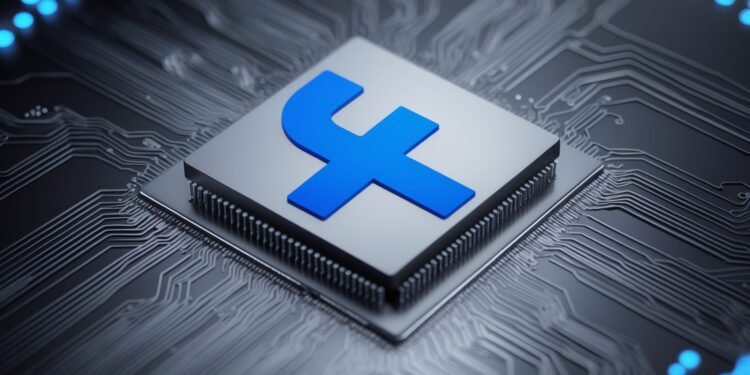Meta, the parent company of Facebook, Instagram, and WhatsApp, has officially begun testing its first in-house AI training chip, signaling a major shift in its artificial intelligence (AI) strategy. This move represents a significant step in Meta’s efforts to reduce reliance on third-party chip manufacturers like NVIDIA and AMD while enhancing its AI capabilities for large-scale machine learning (ML) models.
The increasing demand for AI-driven services across Meta’s platforms—including recommendation algorithms, content moderation, augmented reality (AR), and the metaverse—has pushed the company to develop proprietary AI hardware that optimizes performance, reduces operational costs, and ensures scalability. With the launch of its custom AI training chip, Meta is positioning itself alongside other tech giants such as Google, Microsoft, and Amazon, which have all ventured into developing their own AI accelerators.
Why Meta Needs Its Own AI Training Chip
Growing AI Demands Across Meta’s Platforms
Meta’s AI infrastructure powers some of the most widely used applications in the world, affecting billions of users daily. AI plays a crucial role in Meta’s ecosystem, enabling various functionalities such as:
- Personalized Content Recommendations – AI determines what users see in their Facebook and Instagram feeds, Stories, and Reels, optimizing engagement and user retention.
- Natural Language Processing (NLP) and Chatbots – AI is the backbone of Meta’s AI-driven assistants and customer support chatbots.
- Computer Vision for Content Moderation – AI detects and removes harmful content, ensuring compliance with Meta’s community guidelines.
- Metaverse and Augmented Reality – AI is a fundamental component of the metaverse vision, powering real-time graphics rendering, virtual assistants, and AR experiences.
- Generative AI Applications – AI is being used to create new tools for image and video generation, as well as advanced text-based AI models.
As these AI applications become more sophisticated, the demand for high-performance AI hardware has skyrocketed. Meta currently relies on third-party GPUs, mainly from NVIDIA, to handle AI workloads. However, the increasing demand for AI computational power has led to supply chain issues and soaring costs, prompting Meta to develop its own AI training chip to gain more control over its infrastructure.
Introducing the MTIA: Meta’s AI Training and Inference Accelerator
Meta’s custom AI training chip, Meta Training and Inference Accelerator (MTIA), is designed to optimize AI workloads by focusing on both model training and inference. The development of MTIA is part of Meta’s broader efforts to build a robust AI computing infrastructure that can support its large-scale machine learning models.
Key Features of the MTIA Chip
- Optimized for Meta’s AI Workloads – Unlike general-purpose GPUs that cater to a wide range of AI applications, MTIA is tailor-made for Meta’s specific AI needs, ensuring better efficiency and performance.
- Scalability – The chip is designed to scale efficiently with Meta’s data centers, allowing for seamless expansion as AI workloads grow.
- Cost Efficiency – By developing an in-house AI chip, Meta can significantly cut down on the high costs associated with purchasing and licensing third-party GPUs.
- Energy Efficiency – Custom AI accelerators can be optimized for power consumption, reducing the carbon footprint and operational costs of Meta’s data centers.
- Integration with Meta’s AI Supercomputers – Meta has been investing in AI supercomputers, and the MTIA chip is expected to work in tandem with these high-performance systems.
The Shift Toward Custom AI Hardware in Big Tech
Meta is not alone in the race to develop in-house AI chips. Other tech giants have already made significant strides in AI hardware:
- Google has developed the Tensor Processing Unit (TPU), which is widely used in Google Cloud for AI training and inference.
- Amazon has created the Inferentia and Trainium chips, designed to optimize machine learning workloads for AWS.
- Microsoft has been working on its own AI accelerators to support Azure’s cloud computing infrastructure.
- Apple has built the M-series chips, including the M1 and M2, to optimize AI processing in iPhones, iPads, and Macs.
By joining this trend, Meta is ensuring that it remains competitive in the rapidly evolving AI space while securing greater control over its AI infrastructure.
Challenges in Developing AI Chips
While developing a custom AI chip offers several advantages, it also comes with significant challenges.
1. Technical Complexity
Designing and manufacturing AI accelerators is a highly complex process that requires expertise in semiconductor engineering, chip fabrication, and AI software-hardware integration. Companies like NVIDIA and AMD have decades of experience in chip design, giving them a major advantage.
2. Manufacturing and Supply Chain Constraints
Unlike companies like Apple, which have well-established relationships with chip manufacturers like TSMC, Meta is relatively new to chip development. Ensuring a stable supply chain for its custom AI chips will be a key challenge.
3. Performance Benchmarks Against NVIDIA and AMD
Meta’s MTIA chip will be competing against NVIDIA’s H100 and A100 GPUs, which are currently considered the gold standard in AI computing. It remains to be seen whether Meta’s in-house chip can match or exceed the performance of these industry-leading AI accelerators.
4. Previous Setbacks with AI Hardware
Meta has previously attempted to develop AI inference chips under the “Artemis” project, but faced significant setbacks that led to delays. If similar challenges arise with the MTIA chip, it could slow down Meta’s AI hardware ambitions.
What This Means for Meta’s Future
If Meta’s in-house AI training chip proves successful, it could mark a major turning point in the company’s AI strategy. The ability to develop and control its own AI hardware would give Meta:
- Greater independence from third-party chipmakers
- Lower operational costs and improved scalability
- Enhanced AI capabilities for recommendation systems, generative AI, and AR/VR experiences
- A stronger position in the AI hardware space, competing with companies like Google and Microsoft
Additionally, custom AI chips could play a vital role in Meta’s metaverse ambitions. The metaverse requires enormous computational power for real-time AI-driven experiences, and a dedicated AI accelerator could optimize processing for VR and AR applications.
Conclusion
Meta’s decision to develop its own AI training chip represents a major strategic move in the AI space. As the company continues to push the boundaries of AI research, having a custom chip could be a game-changer, giving Meta a significant edge over competitors reliant on external chip suppliers.
While challenges remain, the successful deployment of the MTIA chip could allow Meta to create more efficient AI models, power next-generation generative AI applications, and build the computational backbone for its vision of the metaverse. If Meta can navigate the hurdles of AI chip development, it may position itself as a leader not only in social media but also in AI hardware and computing.
This development is a clear signal that Meta is taking the AI revolution seriously—by not just using AI, but building the very hardware that will drive it forward.

















